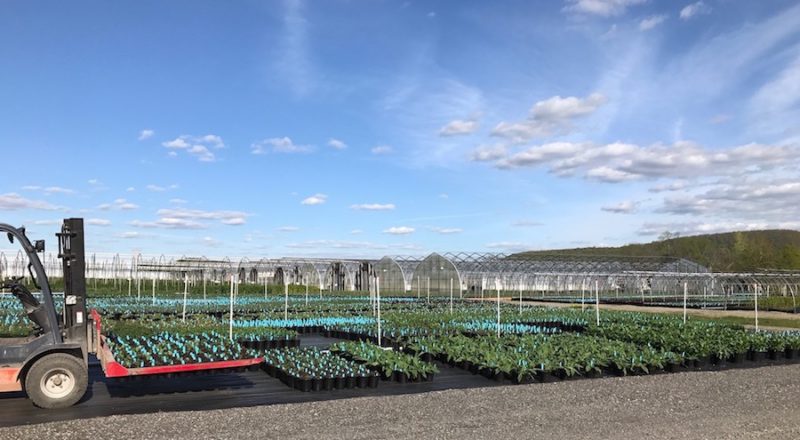
Cover Story — Innovation in Action
Growers some times are slow to change, but implementing a new process, piece of equipment or technique can make a world of a difference. We spoke with three growers to discuss what changes they’ve made in production to improve efficiencies and remain profitable.
ADDRESSING LABOR AT ZINO NURSERY
When Hardscabble Farms, a tree farm headquartered in Croton Falls, New York, purchased greenhouse space four years ago in Dover Plains, New York, the location had been abandoned for 12 years and was in desperate need of renovation.
The purpose of the new location — which currently operates 12 acres of production under the name Zino Nursery — was to produce perennials, grasses, shrubs, evergreens, ferns and other similar products for its wholesale customers.
Because of the nature of the work, they knew finding labor would be a problem. “It was very difficult to find people that are willing to do a lot of the manual labor everyday,” says Brady Cullen, general manager of Zino Nursery. “Part of what we do here is 1-, 2- and 3-gallon-sized pot production. It is a lot of lifting all day long.”
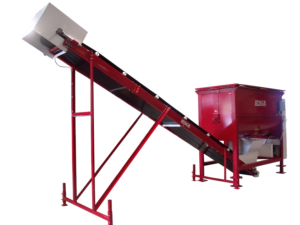 Another issue is labor costs. “We’re not even close to minimum wage,” shares Cullen. “Because of our relation to New York City and the high cost of housing, we have to pay quite a large hourly rate to get even an entry-level person in.”
Another issue is labor costs. “We’re not even close to minimum wage,” shares Cullen. “Because of our relation to New York City and the high cost of housing, we have to pay quite a large hourly rate to get even an entry-level person in.”
After acquiring the space, a year was spent renovating the greenhouses. The grower knew automation would be necessary.“This is where our relationship with Griffin comes in,” shares Cullen. “We depend on Griffin for their high level of service and industry expertise and are grateful to have an industry partner that is always there to help guide us through new upgrades and expansion ideas.”
“The potting line was key,” says Cullen. “When we purchased the greenhouses, our intention was to renovate based upon the potting line so that we could expand quickly with the same amount of people.”
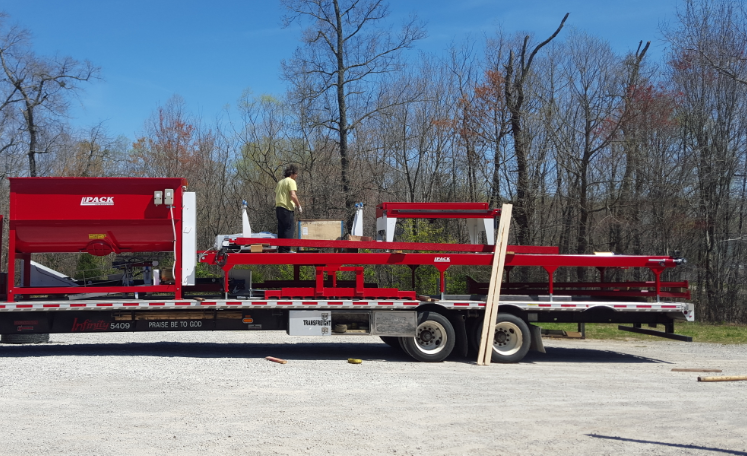 Zino Nursery began with 10 employees, and with the implementation of potting lines from Pack Manufacturing, along with upgrades along the way, the company has since expanded and still employs the same 10 people.
Zino Nursery began with 10 employees, and with the implementation of potting lines from Pack Manufacturing, along with upgrades along the way, the company has since expanded and still employs the same 10 people.
They purchased a whole system from Pack Manufacturing that includes a soil mixer, an incline conveyor and a potting machine. On a good day, Cullen says they are able to do upwards of 10,000 to 12,000 pots in a day, a task that if done manually would only be able to have an output of 1,000 pots per day.
Since the technology was new, Cullen says they were unsure of how fast the line would go. “We’re currently at the stage where we have blown through the original design because we realized we could go a lot faster.”
He says the goal is to get to 16,000 to 18,000 pots per day. He adds, “It might not be that we’re on the potting line all day. Because it’s 10 people, some are on the potting line and those same people are going to do orders for the day. When we have to do shipments, those same people are loading the trucks and trimming back the shrubs.”
Cullen explains that it is quite beneficial for the staff to increase output because every single member is capable of doing every single job. “We try to rotate what the employees are doing all day to avoid that complacency factor,” he says. “No one wants to be on a potting line for 10 hours a day.”
According to Neal Farnham, a regional sales manager with Griffin who works closely with Zino Nursery, Hardscrabble Farms has a unique vision and is in a place of growth within the marketplace.
“As labor costs continue to rise, sometimes adopting costly technology and automation is an option that growers have to take into serious consideration. When we have customers who have this vision of incremental growth, it is really a bright spot to work with people like Zino Nursery,” says Farnham. “We capitalize on that to make sure that the customer is successful because it’s a rare breed that has that kind of vision.”
GOING SUSTAINABLE WITH MEDIA AT DALLAS JOHNSON GREENHOUSES
Dallas Johnson Greenhouses operates more than 80 acres of indoor production space in Council Bluffs, Iowa. The grower produces finished annuals, perennials and potted crops for big box retailers Menards and Lowe’s.
The operation is already MPS certified and is always looking for ways to improve efficiencies and become more sustainable. Two years ago, owner Todd Johnson decided it was time to evaluate its media usage.
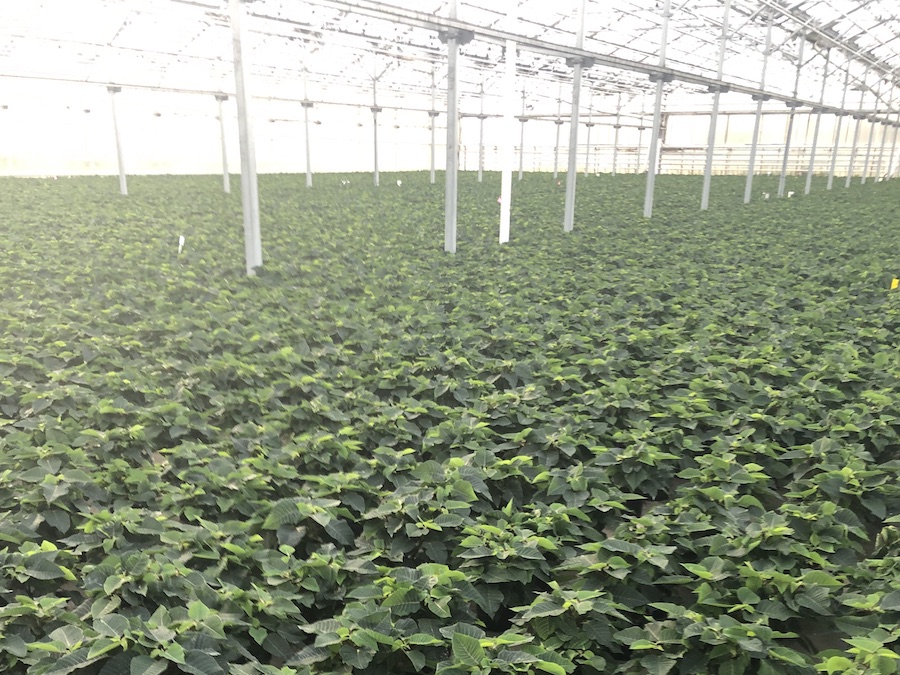 At the time, the grower — like most growers — was mixing its own potting media. According to Head Grower Steve Garvey, they created a mix using perlite, bark and Canadian peat. “And in this new age of sustainability, perlite is not our friend,” he says. “The cost of perlite kept going up. It’s a man-made product, plus there are shipping regulations.”
At the time, the grower — like most growers — was mixing its own potting media. According to Head Grower Steve Garvey, they created a mix using perlite, bark and Canadian peat. “And in this new age of sustainability, perlite is not our friend,” he says. “The cost of perlite kept going up. It’s a man-made product, plus there are shipping regulations.”
It also took a toll on labor. “It made a huge difference with the amount of sick days and workers overall not wanting to work in the potting shed.”
With sustainability and employee satisfaction in mind, the operation transitioned its entire finished production to HydraFiber media. “We were one of the first ones to implement it full scale,” says Garvey. “And we are now going into year three.”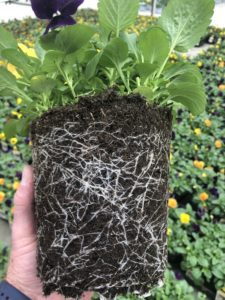
According to Garvey, the benefits were presented almost immediately.
“The roots just explode. Once you get past the first two weeks, you do notice a difference. It makes what you put into the soil — the fertilizer, the PGR, etc. — even more effective. You don’t have to worry about the chemistry tying up nutrients.”
He says HydraFiber is unlike traditional potting soil in that it does require the grower to get more technical and test the soil. Growers do have to be careful and mindful with the product.
“It’s less water consuming, so you don’t have to water as much,” Garvey explains. “It holds water longer, which isn’t always a good thing for a grower. You have to think of it differently.”
Another benefit to its water-holding capacity was that with more control of moisture, they were able to reduce their use of PGRs. “It’s cut down on our chemical usage.”
While the benefits were apparent, there was still a learning curve to perfect the full implementation.
“We no longer needed to add as much starter charge as with a traditional mix,” says Garvey. “We did have to add a wetting agent, though. It was hard to mix, and we didn’t know that at first.”
Another challenge was filling the cells. “This stuff is so light and fluffy that we couldn’t fill six-packs. So when we would run them through the machine, it would only plant halfway full,” he says. “We do 2 million flats of six-packs, and if we can’t fill them we’ll have to run them through twice.”
The solution was fairly easy, however, and only required adjusting the machines. Garvey says the transition was just as much a learning experience for HydraFiber as it was for the growing staff at Dallas Johnson. “They were willing to listen to what we had to say, and there was always open communication. It was new to them, too, and they wanted us to be successful.”
Aside from the advantages in production, it has also saved Dallas Johnson six figures in just transportation costs! “We used to require 70 loads of perlite, and we only need 20 loads of HydraFiber.”
While the switch to HydraFiber was a “trial by fire” situation for the grower, Garvey says they will never go back to traditional media. While the product is used only in finished production currently, may even use it in propagation in the future.
NEW TECHNOLOGY TAKES ROOT AT BELL NURSERY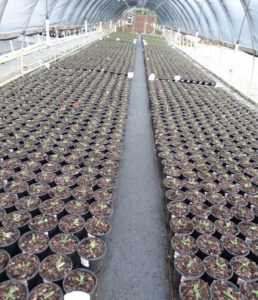
Growers are continually on a quest to find ways to reduce costs and save time in the greenhouse.
The growers at Bell Nursery, with seven production and distribution facilities in five different states (Maryland, Delaware, Virginia, Ohio and North Carolina) are always looking for ways to meet these challenges. The company produces and ships approximately 100 million plants a year to Home Depot stores in Maryland, Virginia, and Delaware, as well as parts of North Carolina, Pennsylvania, Ohio, Indiana and Michigan.
Earlier this year, Bell’s perennial farm in Monroe, North Carolina, began trialing Dümmen Orange’s Basewell rooting technology.
Basewell is a new product form that is produced at Dümmen Orange’s offshore farms. It is a bare-root product that combines the benefits of an unrooted cutting and a rooting cutting. It provides growers with cuttings that have advanced root development but do not require the use of any growing media.
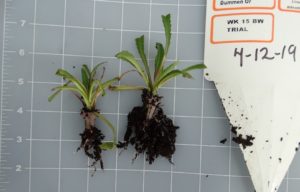 Basewell was developed initially in 2018 for several specific Dümmen Orange annual varieties. Earlier this year it was made available using several of the breeding company’s perennial varieties.
Basewell was developed initially in 2018 for several specific Dümmen Orange annual varieties. Earlier this year it was made available using several of the breeding company’s perennial varieties.
The cuttings are inserted into strips and then covered with the protective gel at Dümmen Orange’s offshore facilities. The gel coating provides root protection during shipping.
The technology helps growers simplify their processes because the Basewell product is shipped from offshore production locations, arriving ready to transplant directly into the finish container. This means more production turns can be completed and propagation space can be converted into finished production space — saving time and money.
Regina Coronado, head grower at Bell’s Monroe facility, started trialing Basewell during Week 16 of this year.
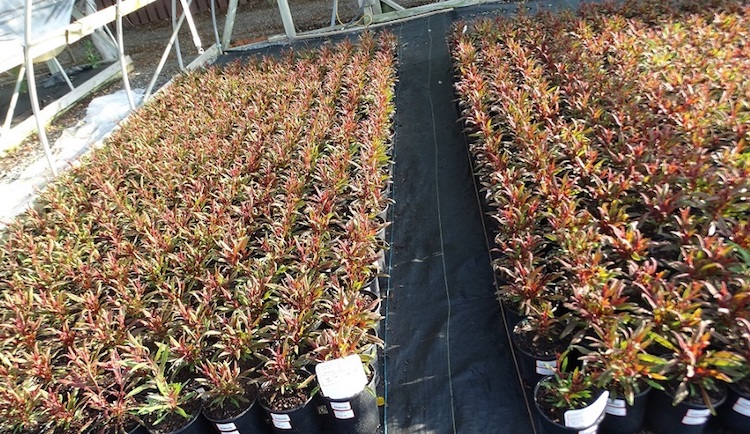 She says Bell was attracted to the new technology for the many benefits it offers. “I think that for many operations that struggle with space for propagation, it could be implemented since you plant the rooted cutting directly in the final container,” she says.
She says Bell was attracted to the new technology for the many benefits it offers. “I think that for many operations that struggle with space for propagation, it could be implemented since you plant the rooted cutting directly in the final container,” she says.
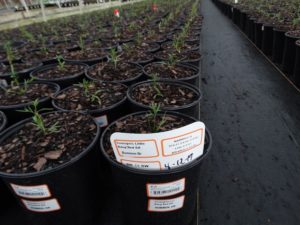 While it is still early in the trial and evaluation process and all of the final numbers are not available yet, Coronado sees the potential time-saving benefits that Bell can take advantage of. “We have not analyzed labor savings since we only have done one trial. If the propagation cost gets eliminated, savings could be high since this technology will save at least six weeks of plug production,” she says.
While it is still early in the trial and evaluation process and all of the final numbers are not available yet, Coronado sees the potential time-saving benefits that Bell can take advantage of. “We have not analyzed labor savings since we only have done one trial. If the propagation cost gets eliminated, savings could be high since this technology will save at least six weeks of plug production,” she says.
Coronado also was extremely pleased with the yields that the Basewell plants achieved. “We grew several varieties and the trial yield was close to 100%. Quality was great; good rooting and great plant growth.”
Coronado says implementing the technology was not difficult either. “Dümmen provided me with a video and if you follow the instructions, the results are amazing. Due to the type of operation here in North Carolina, my favorite quote is, ‘If I can grow it under my conditions, anybody can grow it.’”
Originally developed for Dümmen Orange varieties, the breeding company has announced it is now working with other breeders, like Westhoff and Hishtil, to provide their genetics in the Basewell product form for spring 2020 to the North American market


 Video Library
Video Library 




















